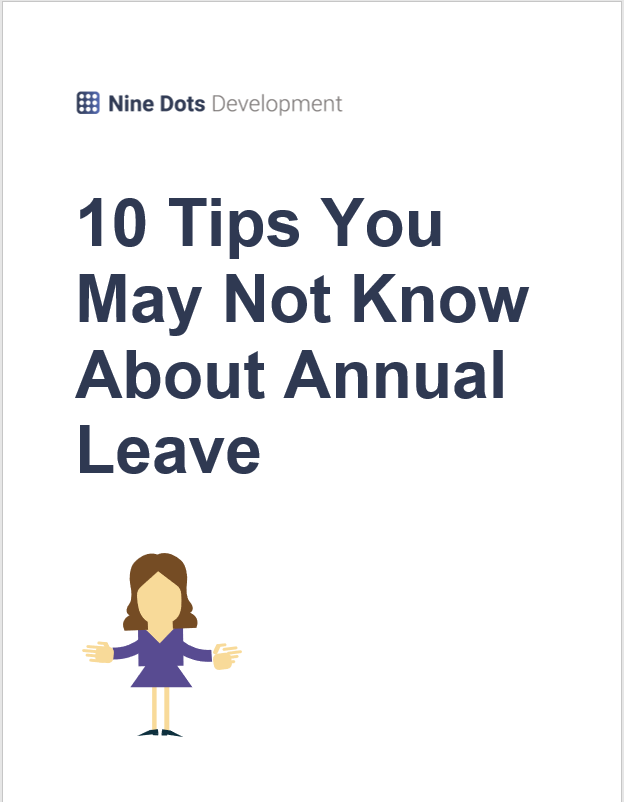Thursday 22 Jul 2021 Article
The Takeaway10 Tips You May Not Know About Annual Leave
The Importance of Annual Leave
Part 1 of 2
#Tips #DidYouKnow #AnnualLeave #PersonalDevelopment #PeopleDevelopment
The perfectly matched resource for this article...
Download Our '10 Tips You May Not Know About Annual Leave'
These '10 Tips You May Not Know About Annual Leave' will help you utilise your annual leave more effectively and start working to live, not living to work.
Download!Playing catchup?
10 Tips You May Not Know About Annual Leave
Contrary to popular belief, annual leave isn’t a luxury, it’s an absolute necessity!.
Famously, Noel Gallagher once said “I don’t live to work; I work to live” - and so should we all; whilst work is undeniably important, our identities should not solely exist through it.
Even though it’s more difficult now than ever to plan holidays due to the constantly changing rules about travel, and a great deal of the UK holiday destinations already being fully booked for stay-cations, it’s in both the employee’s and the organisation’s best interest that employees still utilise their annual leave entitlement.
The Statistics Speak for Themselves…
DFDS, Glassdoor, and Britain’s Healthiest Workplace all recently carried out surveys looking at the importance of rest and employees’ experiences with annual leave. The surveys found that:
- 79% of Brits return to work from holidays feeling significantly less stressed
- 30% of women and 27% of men have not booked a holiday in the past 12 months
- 40% of employees took a only maximum of half their annual leave
- The average employee takes just 62% of their allowance
- High stress and a lack of physical activity cause organisations to lose up to 27 days of productive time per employee each year
- Employees not taking annual leave has huge financial implications; the UK misses out on around £77.5 billion a year in loss of productivity due to mental and physical ill-health, often caused by stress
These statistics show that, ultimately, there is no benefit for not taking annual leave. Employees who take regular holidays are typically more motivated and productive at work, as well as being less prone to accidents and less likely to need time off due to work-related stress.

Annual Leave has Huge Benefits
Every school in the UK gives children regular half term, full term, and summer breaks to allow them to rest and return to school re-energised and ready to work hard again.
This principle applies to adults too - nobody can work at their full potential 100% of the time without regular breaks and decent rest. Whether you spend your annual leave going abroad on holiday, spending time with loved ones, or just relaxing in front of the TV, having time away from work is crucial for:
- Decreasing work-related stress and anxiety
- Avoiding burnout
- Keeping your passion for your career alive
- Giving your mind space to process information and return to work with new ideas
- Looking after your mental wellbeing
- Maintaining a healthy work-life balance
{{ADVERT}}
Using Annual Leave Effectively
Before you can begin planning annual leave, you need to find out exactly how much annual leave you are entitled to (and have left). Typically, you can find this out from your manager or HR department but it can be really beneficial to keep track of your annual leave yourself too so that you always have that information on-hand when you want to schedule your time off.
When it comes to actually booking annual leave, there should be quite a bit of consideration given to the two main factors; - how long do you want off, and when? While a few days off here and there can be nice, quick refreshers, if you’re looking to truly relax and re-energise, you should aim to take at least a week or more off regularly throughout the year. For example, if your annual leave entitlement is 20 days excluding bank holidays, you can have 4 working weeks off - you could take this as one week off every quarter, or two weeks off twice a year, or any other combination that works for you. The important part here is to make sure that you book enough time off to unwind throughout the year
It’s also key to remember that the sooner you can book your annual leave, the better, because your request is more likely to be approved by your manager.
10 Tips You May Not Know About Annual Leave
Negotiating annual leave can at times be tricky, so it can be extremely useful to be aware of the lesser-known tips that can make utilising your annual leave much easier. We have compiled a list of 10 Tips You May Not Know About Annual Leave to help you utilise your annual leave more effectively and start working to live, not living to work. You can click here or click the button at the bottom of this article to download these 10 Tips.
---
In our next Daily Dot post, we will be exploring the history of annual leave and how it came to be a legal requirement, and looking at why Richard Branson decided to give his staff unlimited annual leave, and the impact this had on Virgin Media.
Until next time...
Download Our '10 Tips You May Not Know About Annual Leave'
These '10 Tips You May Not Know About Annual Leave' will help you utilise your annual leave more effectively and start working to live, not living to work.
Download!Missed an article?
More from The Importance of Annual Leave
